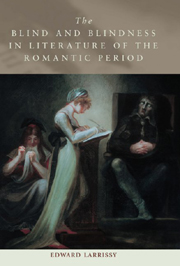Book contents
- Frontmatter
- Contents
- Preface
- Acknowledgements
- 1 The Enigma of the Blind
- 2 The Celtic Bard in Ireland and Britain: Blindness and Second Sight
- 3 Blake: Removing the Curse by Printing for the Blind
- 4 Edifying Tales
- 5 Wordsworth's Transitions
- 6 Coleridge, Keats and a Full Perception
- 7 Byron and Shelley: The Blindness of Reason
- 8 Mary Shelley: Blind Fathers and the Magnetic Globe: Frankenstein with Valperga and The Last Man
- 9 Conclusion
- Bibliography
- Index
7 - Byron and Shelley: The Blindness of Reason
Published online by Cambridge University Press: 12 September 2012
- Frontmatter
- Contents
- Preface
- Acknowledgements
- 1 The Enigma of the Blind
- 2 The Celtic Bard in Ireland and Britain: Blindness and Second Sight
- 3 Blake: Removing the Curse by Printing for the Blind
- 4 Edifying Tales
- 5 Wordsworth's Transitions
- 6 Coleridge, Keats and a Full Perception
- 7 Byron and Shelley: The Blindness of Reason
- 8 Mary Shelley: Blind Fathers and the Magnetic Globe: Frankenstein with Valperga and The Last Man
- 9 Conclusion
- Bibliography
- Index
Summary
Byron, Milton and the Two Reasons
The most significant example of the blind to be found in Byron is that of Milton, ‘the blind Old Man’. To contemplate the meaning of this figure for Byron is to understand something essential to him, something which lays bare the complexity of the links between the aesthetic and the political in his work. The most illuminating point of entry to this question is by way of the collocation of Milton, Dryden and Pope in Don Juan. In this context, they function as repositories of classical value, opposed to the poetics of Wordsworth, Coleridge and Southey. But Milton sits oddly with the other two, both politically and aesthetically. However, before addressing this issue, it will be useful to consider yet again the question of Byron's classicism. In particular, the conception of classical reason is revealing of a fertile contradiction in his work.
There are, roughly speaking, two reasons in Byron. Both have political implications; both are conceived as possessing classical sanction. Put this simply the formula might sound misleading, as if it were offering as much as a similar distinction might offer in a discussion of, say, Coleridge: something about Ralph Cudworth as opposed to Joseph Priestley, perhaps. Whereas I intend my distinction to refer only to what I shall call respectively Augustan Reason and Enlightenment Reason – referring, by the former, to the age of Dryden and Pope, and not to that of Maecenas and Horace.
- Type
- Chapter
- Information
- The Blind and Blindness in Literature of the Romantic Period , pp. 172 - 187Publisher: Edinburgh University PressPrint publication year: 2007



